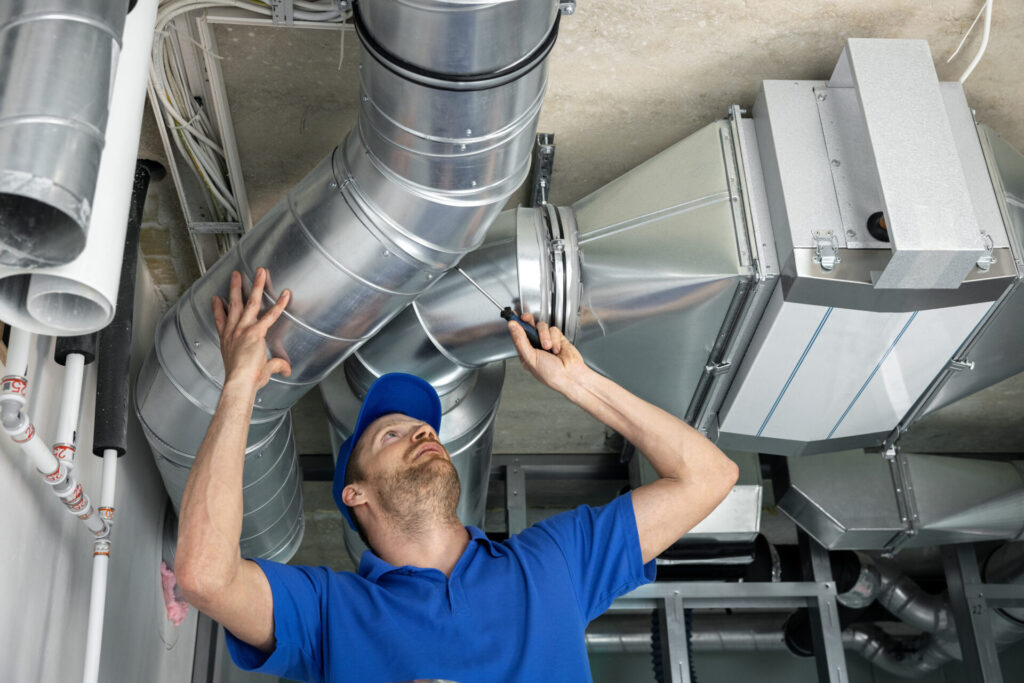Proper insulation improves HVAC efficiency by reducing heat transfer, lowering energy costs, and maintaining consistent indoor temperatures. It helps your system work less, saving up to 20% on energy bills and extending the lifespan of your heating and cooling equipment.
Keeping your home warm in winter and cool in summer is essential in Washington’s climate. Insulation plays a vital role in making your HVAC system efficient, reducing energy costs, and maintaining comfort year-round. Here’s why insulation matters and how it benefits homeowners in Washington.
Why Proper Insulation is Essential
Insulation helps minimize heat transfer in and out of your home, which reduces the load on your HVAC system. This leads to:
- Lower energy bills as your HVAC works less.
- Consistent indoor temperatures with fewer hot and cold spots.
- Reduced wear and tear on your HVAC system, extending its lifespan.
By improving insulation, you’re not just saving money but also helping the environment by reducing energy consumption.
Learn more about energy-saving HVAC upgrades.
Best Insulation Types for Washington Homes
Choosing the right insulation depends on your home’s needs. Here are some of the most effective options:
Spray Foam Insulation
This type seals gaps and cracks, making it ideal for older homes. It also helps reduce drafts significantly.
Fiberglass Insulation
Fiberglass is cost-effective and works well in attics and walls. It’s durable and helps maintain indoor temperatures efficiently.
Reflective Insulation
Reflective insulation is great for ductwork. It reduces heat gain, especially in warmer months, enhancing Consider reflective insulation for your ducts to save energy. Contact us for professional ductwork services.
HVAC efficiency.
How Insulation Improves HVAC Performance
When your home is well-insulated, your HVAC system doesn’t need to work as hard. Here’s how insulation impacts performance:
- Energy Efficiency: Insulation reduces energy loss, helping your HVAC maintain the desired temperature with less effort.
- System Durability: By reducing strain, insulation prolongs the life of your heating and cooling equipment.
- Environmental Benefits: With less energy usage, your carbon footprint decreases, making your home eco-friendly.
Check out our guide on how to extend the life of your HVAC system.
Signs You Need Better Insulation
Wondering if your home could benefit from improved insulation? Here are some telltale signs:
- Uneven temperatures across rooms.
- High energy bills despite limited HVAC usage.
- Noticeable drafts near windows or doors.
If you’re experiencing any of these issues, it’s time to evaluate your insulation. Schedule a home energy audit to identify weak spots.
Residential vs. Commercial Insulation Needs
Insulation requirements differ significantly between homes and commercial spaces. Understanding these differences ensures optimal HVAC performance:
- Residential Insulation: Focuses on attics, walls, and floors to improve indoor comfort and energy efficiency. Learn more about residential heating services.
- Commercial Insulation: Designed to regulate larger spaces and comply with energy efficiency standards. Explore our commercial services.
Steps to Improve Insulation in Washington Homes
Improving your home’s insulation doesn’t always require a major renovation. Here are simple yet effective steps to get started:
- Seal Gaps and Cracks: Use caulking or weatherstripping around doors and windows.
- Upgrade Attic Insulation: Add spray foam or fiberglass insulation to reduce heat loss.
- Insulate Ductwork: Poorly insulated ducts can lose up to 30% of heated or cooled air.
For a comprehensive solution, schedule a professional insulation service.
Cost of Insulation and Expected Savings
Investing in insulation pays off in the long run. Here’s a quick look at costs and benefits:
| Insulation Type | Average Cost | Energy Savings |
|---|---|---|
| Fiberglass | $0.40 – $1.50/sq ft | Up to 20% |
| Spray Foam | $1.50 – $5.00/sq ft | Up to 30% |
| Reflective Insulation | $0.50 – $2.00/sq ft | Up to 15% |
Better insulation can reduce your heating and cooling bills by hundreds of dollars annually. Read our tips on saving money on heating bills.
FAQs About Insulation and HVAC Efficiency
How often should insulation be inspected?
It’s recommended to check insulation annually, especially in attics and crawl spaces, for wear or moisture damage.
Which insulation is best for older homes?
Spray foam works well in older homes due to its sealing properties, reducing drafts and improving energy efficiency.
Does insulation affect indoor air quality?
Yes, good insulation prevents external pollutants and allergens from entering, improving air quality indoors.
Contact Us for Expert Insulation and HVAC Services
Upgrading insulation is a simple step that leads to significant benefits for your HVAC system and overall comfort. Whether you need residential or commercial solutions, we’re here to help.
Schedule a consultation today or call us at TEL:+123456789 for personalized advice and services tailored to your needs.

